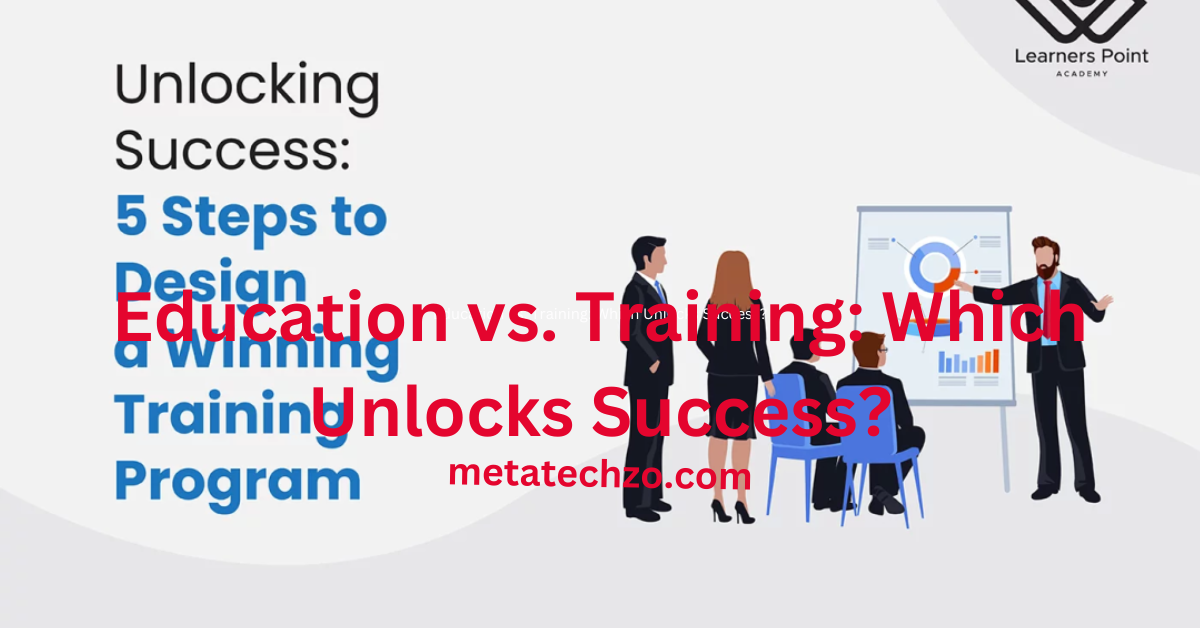Education vs. Training: Which Unlocks Success?
Introduction
The debate over whether education or training holds the key to success is one that has persisted for generations. Students, professionals, and employers often find themselves grappling with the question: “Is education or training more important?” While both play crucial roles in shaping an individual’s career and future, they serve different purposes and offer unique advantages. This article explores the distinctions between education and training, examines their respective benefits and drawbacks, and offers insights into how to effectively integrate both for optimal success.
Defining Education and Training
What is Education?
Education refers to the formal process of learning that typically takes place in academic institutions such as schools, colleges, and universities. It encompasses a broad spectrum of knowledge, from the humanities and sciences to social sciences and the arts. Education is often theoretical, focusing on developing critical thinking, problem-solving skills, and a deep understanding of various subjects. The goal of education is to equip individuals with a well-rounded foundation of knowledge that can be applied in various aspects of life and work.
What is Training?
Training, on the other hand, is a more practical and skill-oriented approach to learning. It is designed to teach specific skills or competencies required to perform particular tasks or jobs. Training is often hands-on and is typically provided in a work environment, technical school, or through vocational programs. The primary objective of training is to prepare individuals to meet the immediate needs of a particular job or industry by developing expertise in a specific area.
The Benefits of Education
Broad Knowledge Base
One of the most significant advantages of education is the broad knowledge base it provides. Through education, individuals gain exposure to a wide range of subjects and disciplines, allowing them to develop a well-rounded perspective. This broad knowledge can be invaluable in navigating complex problems, making informed decisions, and adapting to various situations in both personal and professional life.
Critical Thinking and Problem-Solving
Education fosters critical thinking and problem-solving skills. By engaging with diverse topics and ideas, students learn to analyze information, question assumptions, and develop reasoned arguments. These skills are essential for success in many professions, particularly those that require strategic thinking and decision-making.
Long-Term Career Growth
Education is often seen as a long-term investment in one’s career. A strong educational background can open doors to higher-level positions, greater job stability, and increased earning potential. Many employers place a high value on formal education, particularly for roles that require advanced knowledge or leadership capabilities.
The Benefits of Training
Practical Skills and Immediate Application
The primary benefit of training is the acquisition of practical skills that can be immediately applied in the workplace. Training programs are typically designed to meet the specific needs of a job or industry, ensuring that individuals are well-prepared to perform their duties effectively from day one.
Industry-Specific Expertise
Training allows individuals to develop specialized expertise in a particular field or industry. This focused approach can be especially advantageous in technical or hands-on professions where specific skills are in high demand. For example, a certified technician or tradesperson with targeted training may have a clear advantage in the job market.
Adaptability and Flexibility
Training programs are often more flexible and adaptable than formal education. They can be tailored to meet the evolving needs of the workforce and can be completed in a shorter time frame. This adaptability makes training an attractive option for individuals looking to quickly upskill or transition into a new career.
The Drawbacks of Education and Training
Drawbacks of Education
While education offers many benefits, it is not without its drawbacks. One of the main criticisms of formal education is that it can be time-consuming and costly. Many students graduate with significant debt and may find that their degree does not guarantee immediate job placement. Additionally, the theoretical nature of education may leave some graduates lacking the practical skills needed for specific jobs.
Drawbacks of Training
Training, while practical and focused, can also have limitations. Because training is often specific to a particular job or industry, it may not provide the broader knowledge and critical thinking skills that education does. This specialization can limit an individual’s ability to adapt to changes in the job market or transition to different career paths. Moreover, without a solid educational foundation, individuals may find it challenging to advance into higher-level positions that require more comprehensive knowledge.
Combining Education and Training for Optimal Success
Rather than viewing education and training as mutually exclusive, the most successful individuals and organizations recognize the value of combining both. Education provides the foundational knowledge and critical thinking skills that are essential for long-term success, while training offers the practical skills needed to excel in specific roles. By integrating education and training, individuals can build a versatile skill set that enables them to thrive in a dynamic and ever-changing job market.
Lifelong Learning
One of the key strategies for combining education and training is embracing lifelong learning. This approach involves continuously seeking opportunities to learn and grow, whether through formal education, professional training, or self-directed learning. By staying current with industry trends and continuously developing new skills, individuals can maintain a competitive edge throughout their careers.
Customized Learning Paths
Another effective strategy is to create customized learning paths that blend education and training. For example, individuals might pursue a degree in a broad field such as business or engineering, while simultaneously engaging in specialized training programs that align with their career goals. This combination allows for both depth and breadth of knowledge, equipping individuals to succeed in their chosen professions.
Conclusion
The question of whether education or training is more important is not easily answered, as both play crucial roles in shaping an individual’s future. Education provides the broad knowledge base and critical thinking skills necessary for long-term career growth, while training offers the practical skills required for immediate job success. By recognizing the unique benefits of each and strategically combining them, individuals can maximize their potential and achieve success in their personal and professional lives. In the end, the true “golden ticket” to success lies in the ability to effectively integrate both education and training into a lifelong journey of learning and growth.



